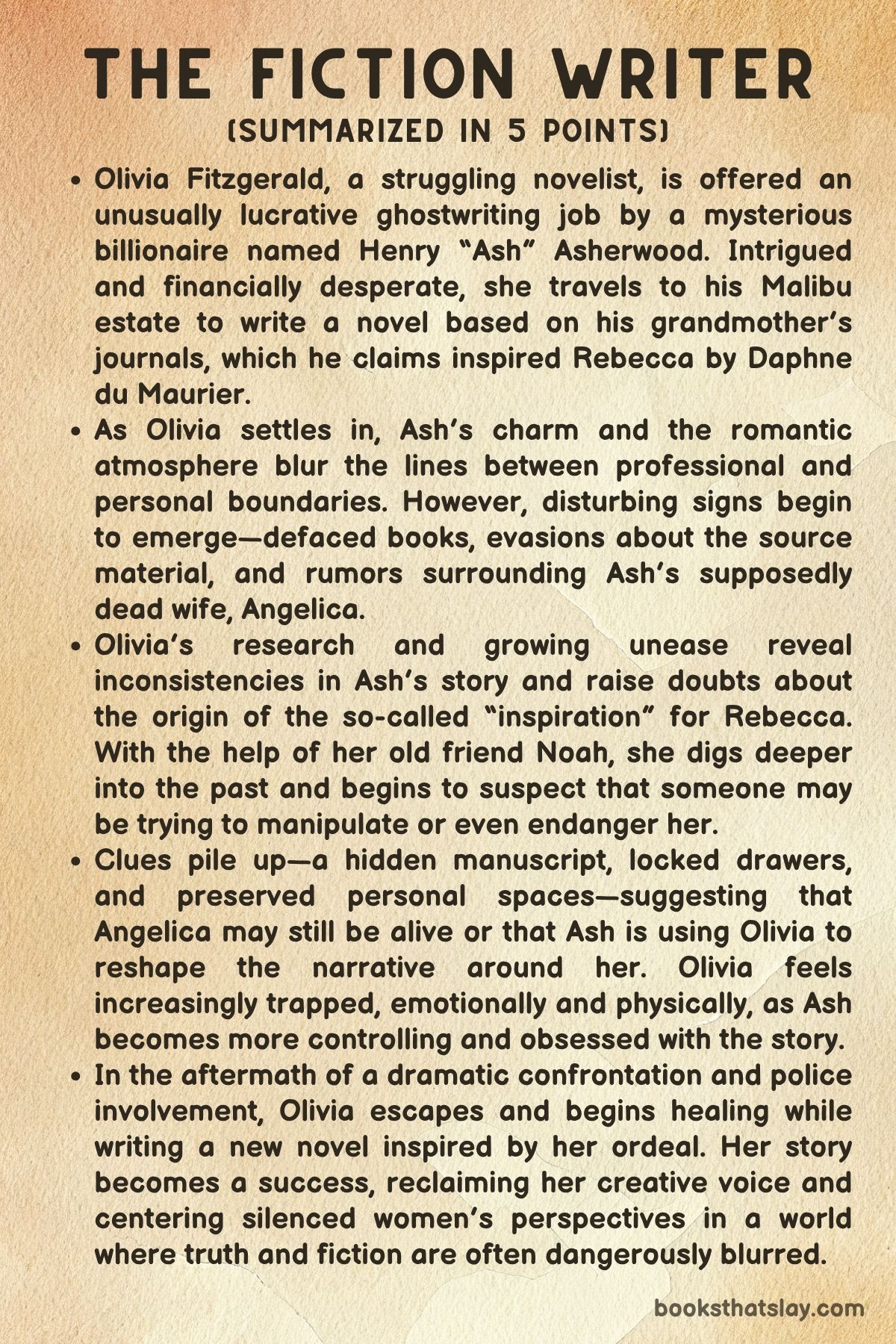The Fiction Writer Summary, Characters and Themes
The Fiction Writer by Jillian Cantor is a gripping psychological suspense novel by Jillian Cantor that explores obsession, authorship, and the blurry lines between fiction and truth. Set in the contemporary literary world but haunted by echoes of the classic gothic novel Rebecca, the story follows a struggling writer hired to ghostwrite what appears to be a scandalous origin tale behind one of literature’s most famous novels.
As she becomes embedded in the enigmatic life of her client, reality begins to warp, secrets rise to the surface, and questions of identity, truth, and narrative control loom large. The book is as much about storytelling as it is about manipulation, offering readers a modern gothic tale wrapped in layers of mystery and metafiction.
Summary
Olivia Fitzgerald is a once-promising novelist living in Boston, whose career has stalled after the failure of her second book, a modern retelling of Rebecca. She is unexpectedly offered a lucrative ghostwriting job by her agent—$50,000 upfront—with little information provided except the stipulation that she must fly to Malibu and meet the client in person.
Curiosity and financial desperation push her to accept the project. The client turns out to be Henry “Ash” Asherwood III, a wealthy, charismatic widower whose family estate towers above the Malibu coastline in a glass house filled with secrets.
He claims that his grandmother, Emilia Asherwood, wrote a set of journals that tell the “real” story behind Rebecca, accusing Daphne du Maurier of literary theft. Ash insists these journals form the true basis of du Maurier’s novel, and he wants Olivia to help turn them into a modern bestseller to finally set the record straight.
Olivia is fascinated but also skeptical. She starts her research and uncovers that du Maurier had been accused of plagiarism before.
When she finally receives translated portions of the journals, she reads about Emilia’s passionate and jealous relationship with a man named André. The story mirrors Rebecca eerily, drawing Olivia deeper into her assignment.
As she becomes more involved, Olivia also reconnects with an old friend, Noah, back in Los Angeles. Their conversations offer a contrast to the increasingly controlling dynamic with Ash, who begins to exert subtle pressure on Olivia to stay focused and isolate herself from outside influence.
Ash’s charm veils a possessive edge. Olivia finds signs that she might not be alone in the house—items displaced, cigarette butts left behind—and starts suspecting that Ash is hiding something.
Her suspicions grow when she finds defaced copies of her own book in the guest room, marked with words like “THIEF” and “LIAR.” She begins to believe that Ash’s late wife, Angelica, may still be alive—or at least that someone is trying to unsettle her.
A key she discovers unlocks a drawer filled with letters in which Emilia explicitly states that her story should never be told. This undermines the entire foundation of the ghostwriting project.
As a storm cuts off communication and isolates Olivia in the mansion, she explores more of the house and finds a perfectly preserved bedroom with signs of recent use. A lipstick-stained coffee cup and a coat on a hook suggest Angelica never left.
She also finds a manuscript titled The Wife, which reads as a modern tale of a manipulative marriage and emotional captivity. Olivia becomes convinced that The Wife is Angelica’s work and that Ash is using Emilia’s name to mask his obsession with completing Angelica’s story.
When Olivia tries to escape, she finds herself effectively imprisoned. Her phone is missing, the guesthouse locked.
She contacts Noah through Ash’s computer. He arrives with the police just as Ash’s behavior takes a disturbing turn.
The authorities uncover evidence suggesting Angelica may have survived the car crash that supposedly killed her. They find that Ash had been hiding her manuscript while attempting to shape Olivia into its voice.
Olivia escapes, emotionally shaken but safe. She moves in briefly with Noah and begins writing again—not to fulfill anyone else’s narrative, but to reclaim her own voice.
The trauma of Malibu becomes the seed of her next novel. She explores power, manipulation, and silenced women.
In the epilogue, we learn her new book becomes a critical success. Olivia shares, in an interview, her belief that the most meaningful stories are those that give voice to women who have long been erased from their own histories.

Characters
Olivia Fitzgerald
Olivia is the emotional and psychological core of The Fiction Writer. As a struggling novelist dealing with professional failure and lingering personal trauma, she begins the story in a place of vulnerability.
Her creative burnout and recent heartbreak have left her open to suggestion, which is why she quickly accepts the mysterious ghostwriting offer despite the red flags. Olivia’s journey is one of regaining agency and rediscovering her voice—both literally and metaphorically.
Her initial deference to Ash’s charm and flattery slowly erodes as she confronts the haunting parallels between Emilia’s journals, Rebecca, and her own circumstances. She’s a writer desperate to tell a story, but she is also a woman determined not to be consumed by someone else’s narrative.
As the layers of the Asherwood estate and Ash’s intentions unravel, Olivia evolves from passive observer to empowered creator. Her arc culminates in the reclamation of her autonomy and authorship, turning her trauma into powerful fiction.
She ends the novel transformed—emotionally and artistically.
Henry “Ash” Asherwood III
Ash is an enigmatic and deeply flawed character who straddles the line between charismatic benefactor and manipulative antagonist. As a reclusive billionaire grieving his late wife, Angelica, and obsessed with his grandmother Emilia’s journals, he initially presents himself as a patron of literature and a man wounded by loss.
However, his true motivations gradually reveal a darker, more controlling nature. His insistence on Olivia writing a very specific version of the story suggests he is less interested in truth and more in narrative manipulation.
Ash’s psychological complexity lies in his inability to differentiate love from control, grief from obsession, and memory from fabrication. His need to possess and shape the women in his life—whether Angelica or Olivia—echoes the dynamics of gothic fiction.
This makes him a modern-day Maxim de Winter figure. Ash’s downfall is marked by his unraveling mental state, culminating in his breakdown and eventual psychiatric commitment.
In the end, it becomes clear that his literary aspirations were merely a facade for a deeper, unresolved psychological rupture.
Noah
Noah functions as a moral compass and emotional anchor within the story. As Olivia’s old friend and fellow writer, he represents stability, truth, and professional integrity—everything Ash undermines.
Though he starts as a minor presence, Noah’s importance grows as Olivia’s situation becomes more dangerous. His warnings about the dangers of fiction overtaking reality demonstrate his understanding of the creative psyche.
His concern for Olivia’s well-being underscores a quiet, persistent care. Noah is not a traditional romantic lead, but his grounded presence offers Olivia a foil to Ash’s intensity.
By the end, his loyalty and protective instincts help extract Olivia from the toxic world she’s been drawn into. Noah’s support is instrumental in Olivia’s healing process and in the rebuilding of her creative life.
He represents the possibility of healthy relationships and creative autonomy.
Angelica Asherwood
Though largely absent in a physical sense, Angelica exerts a ghostly influence over the entire narrative. Initially presumed dead, her presence is hinted at through defaced books, unexplained noises, and unspoken memories that saturate the Asherwood estate.
As the story progresses, Angelica emerges as a complex symbol of suppressed voices and erased truths. The discovery of The Wife, which Olivia suspects to be Angelica’s work, reframes Angelica not as a passive victim but as a silenced author whose narrative was hijacked.
Her characterization becomes more nuanced—possibly a woman trapped in a toxic marriage, trying to reclaim her story through writing, only to have her voice co-opted by her husband. Whether she is alive, dead, or in hiding, Angelica represents the novel’s central thematic concern with authorship, control, and the erasure of women’s stories.
Her shadow looms large over every decision Ash makes. She becomes the key to unlocking both the mystery and Olivia’s own transformation.
Emilia Asherwood
Emilia, Ash’s grandmother, serves as both a narrative catalyst and a symbolic figure. Through her journals—translated and delivered in fragments—she is initially presented as the real-life muse for Rebecca, potentially robbed of recognition by Daphne du Maurier.
However, the more Olivia reads, the more Emilia’s own warnings against her story being told complicate the picture. Emilia’s voice is filtered through layers of time, translation, and intention, making her both present and elusive.
Her tale of obsession, love, and loss mirrors the gothic undercurrents of the plot. But her desire to keep her narrative private introduces ethical questions about posthumous storytelling and literary exploitation.
Emilia is not simply a victim of theft or a tragic romantic; she is also a woman with agency who sought to maintain ownership of her life’s narrative. Her character becomes a mirror for Olivia, forcing the protagonist to confront her role not just as a writer but as a steward of truth.
She reinforces the theme that the right to tell a story belongs first to the one who lived it.
Themes
The Blurred Line Between Fiction and Reality
A central theme in The Fiction Writer is the unstable boundary between fiction and reality, particularly as experienced through the mind of the protagonist, Olivia Fitzgerald. As a ghostwriter hired to recreate a story based on supposed real events, Olivia finds herself immersed in a world where truth is elusive and narrative is shaped by perception and manipulation.
The novel raises important questions about authorship and ownership of stories, especially when Olivia discovers that the journals supposedly written by Emilia Asherwood may not be the true source of the tale Ash wants to tell. This uncertainty intensifies as Olivia stumbles upon a hidden manuscript that seems authored by Angelica, calling into question everything she has been told.
Olivia’s increasing emotional involvement, coupled with her physical isolation and psychological distress, mirrors the gothic tradition where the protagonist’s grasp on reality begins to unravel. Her identity as a writer—someone who constructs fiction—ironically becomes a liability, making her vulnerable to narrative coercion.
Jillian Cantor uses this erosion of the fact-fiction barrier to highlight how storytelling, particularly when weaponized, can distort history and identity. By the end of the novel, Olivia reclaims her agency by telling her own story, but the journey there is fraught with manipulation, illusion, and a haunting recognition of how fiction can become a mask for truth or a tool for erasure.
Female Agency and Silenced Voices
Another prominent theme is the exploration of female agency in a world that often seeks to suppress or appropriate women’s voices. From the defaced copies of Olivia’s novel to the hidden manuscript possibly written by Angelica, the narrative underscores the ways in which women’s stories are repeatedly obscured, stolen, or reshaped by male figures.
Ash, for all his charm, emerges as a controlling figure who attempts to rewrite the past not to honor Emilia or Angelica, but to satisfy his own version of the truth. He commissions Olivia not to discover a hidden legacy, but to give form to his obsessive narrative, one that may be fictional at its core.
This theme is further deepened by the manuscript titled The Wife, which provides a direct counterpoint to Ash’s perspective. It is a desperate yet powerful act of expression from a woman rendered voiceless by those around her.
Olivia’s evolution from a struggling ghostwriter to an empowered author mirrors the reclamation of this voice. Her decision to write her own novel after escaping the Asherwood estate symbolizes the ultimate act of defiance and self-definition.
In doing so, the novel critiques a literary and societal tradition that too often celebrates male genius while marginalizing or erasing the contributions and suffering of women. The theme resonates on both personal and professional levels, as Olivia not only escapes a potentially abusive dynamic but also emerges with a clearer understanding of her creative worth.
Obsession and Control
Obsession operates as a dark undercurrent throughout the novel, manifesting most clearly in Ash’s behavior and gradually influencing Olivia’s psychological state. Ash is portrayed as a man haunted by loss and driven by an almost fanatical need to immortalize his wife’s legacy—or his version of it.
His fixation on Emilia’s journals, the story of Rebecca, and Olivia’s role in recreating the narrative spirals into an all-consuming need to control every aspect of the storytelling process, and eventually, Olivia herself. What begins as a professional collaboration quickly transforms into a possessive relationship in which Olivia’s freedom, both physical and emotional, is compromised.
This theme of control is most chillingly realized when she finds herself literally locked inside the guest house and cut off from communication. Ash’s manipulation is not overtly violent but is insidiously embedded in charm, flattery, and psychological coercion.
Meanwhile, Olivia, despite her instincts, finds herself increasingly entangled in Ash’s emotional orbit. This entrapment reflects the gothic motif of the unreliable benefactor or romantic interest who masks sinister intentions.
The theme culminates in Olivia’s realization that Ash’s true intent may not be to uncover a hidden literary truth, but to use her as a proxy for his own unresolved grief and delusions. Ultimately, her escape and reclamation of authorship are not just acts of physical freedom but psychological liberation from a relationship defined by obsession masquerading as admiration.
The Power of Storytelling
The Fiction Writer serves as a meditation on the transformative and potentially dangerous power of storytelling. Every major character is deeply influenced by stories—whether it’s Ash’s belief in a buried literary injustice, Angelica’s desperate need to articulate her version of the truth, or Olivia’s own struggle to find meaning through writing after a series of creative and emotional failures.
The narrative suggests that stories do not simply reflect reality—they shape it, reinterpret it, and sometimes obscure it entirely. Ash’s belief that Emilia’s journals inspired Rebecca represents a desire to revise literary history through selective storytelling, while Olivia’s job as a ghostwriter positions her at the mercy of others’ narratives.
Yet, as the novel progresses, it becomes increasingly clear that storytelling also holds the potential for emancipation and self-redefinition. Olivia’s decision to abandon the ghostwriting project and write her own novel marks a turning point in her personal arc.
The success of her new work, as seen in the epilogue, reflects a more authentic alignment between her identity and her craft. The novel thus emphasizes that the most meaningful stories are not necessarily those that gain commercial or historical recognition, but those that emerge from unfiltered truth, especially when they challenge established versions of events.
In doing so, the book pays homage to the silenced storytellers whose words may be buried but whose truths remain powerful.


